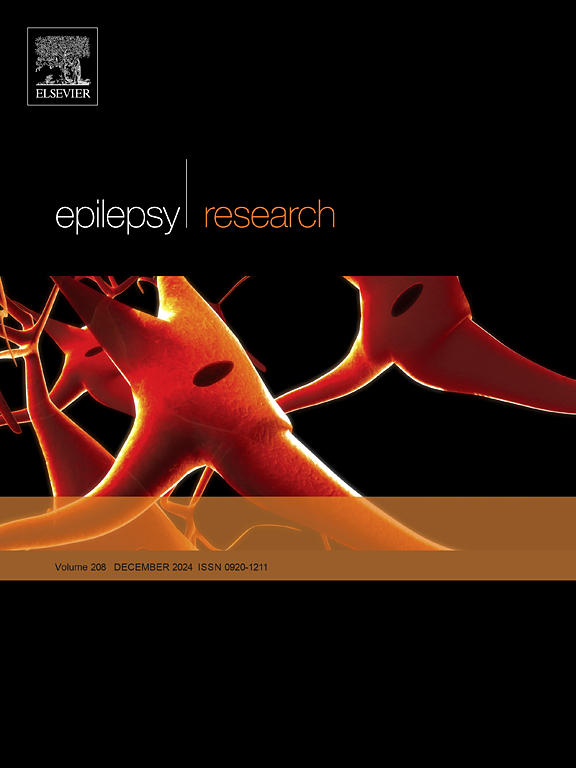Post-pregnancy changes in seizure frequency and antiseizure medication treatment
IF 2
4区 医学
Q3 CLINICAL NEUROLOGY
引用次数: 0
Abstract
Background
Maternal seizures during the post-pregnancy period are associated with severe morbidity and increased risk of mortality, and pose a risk of injury to their babies, that may be sometimes life threatening.
Objectives
To evaluate whether seizure frequency during post-pregnancy is higher compared to the pre-pregnancy period and to nonpregnant women with epilepsy.
Methods
We retrospectively reviewed the computerized database and the medical records of all the women with epilepsy who were followed-up in our adult epilepsy clinic during an 8-year period (2012–2020), and identified 42 pregnancies in 34 women. The control group included 42 nonpregnant women with epilepsy, matched for age and epilepsy type.
Results
Mean monthly seizure frequency, seizure freedom rates and changes of seizure frequency during pregnancy and post-pregnancy did not significantly differ between pregnant women and controls. Among pregnant women there was a trend towards decreased seizure frequency during post-pregnancy (p = 0.076). Pregnant women received fewer antiseizure medications (ASMs) during pregnancy (1.3 vs 2) (p = 0.004) and post-pregnancy (1.4 vs 1.9) (p = 0.023) compared to controls, with a trend towards fewer ASMs during pre-pregnancy (p = 0.051). Compared to controls, changes of ASM treatment were more common in pregnant women during post-pregnancy (57.1 % vs 33.3 %) (p = 0.048), with a trend towards more common ASM changes during pregnancy (p = 0.073).
Conclusions
Seizure frequency during post-pregnancy in women with epilepsy who are managed according to the guidelines did not significantly differ in this cohort from that during pre-pregnancy and during the same epoch in nonpregnant women with epilepsy.
妊娠后癫痫发作频率变化及抗癫痫药物治疗
背景:妊娠后期产妇癫痫发作与严重发病率和死亡风险增加有关,并可能对婴儿造成伤害,有时可能危及生命。目的探讨妊娠后癫痫发作频率是否高于孕前及非妊娠癫痫患者。方法回顾性分析我院成人癫痫门诊随访8年(2012-2020年)的所有癫痫女性患者的计算机数据库和医疗记录,发现34例42例妊娠。对照组包括42名未怀孕的癫痫患者,年龄和癫痫类型相匹配。结果孕妇与对照组的月平均癫痫发作频率、发作自由率、孕期及产后癫痫发作频率变化无显著差异。在孕妇中,妊娠后发作频率有降低的趋势(p = 0.076)。与对照组相比,孕妇在妊娠期间(1.3 vs 2) (p = 0.004)和妊娠后(1.4 vs 1.9) (p = 0.023)服用抗癫痫药物(asm)较少,妊娠前(p = 0.051)服用抗癫痫药物的趋势更少。与对照组相比,ASM治疗的改变在妊娠后的孕妇中更常见(57.1% % vs 33.3% %)(p = 0.048),并且在妊娠期间更常见ASM改变的趋势(p = 0.073)。结论:根据指南管理的妊娠后癫痫妇女发作频率与妊娠前和同一时期非妊娠癫痫妇女发作频率无显著差异。
本文章由计算机程序翻译,如有差异,请以英文原文为准。
求助全文
约1分钟内获得全文
求助全文
来源期刊

Epilepsy Research
医学-临床神经学
CiteScore
0.10
自引率
4.50%
发文量
143
审稿时长
62 days
期刊介绍:
Epilepsy Research provides for publication of high quality articles in both basic and clinical epilepsy research, with a special emphasis on translational research that ultimately relates to epilepsy as a human condition. The journal is intended to provide a forum for reporting the best and most rigorous epilepsy research from all disciplines ranging from biophysics and molecular biology to epidemiological and psychosocial research. As such the journal will publish original papers relevant to epilepsy from any scientific discipline and also studies of a multidisciplinary nature. Clinical and experimental research papers adopting fresh conceptual approaches to the study of epilepsy and its treatment are encouraged. The overriding criteria for publication are novelty, significant clinical or experimental relevance, and interest to a multidisciplinary audience in the broad arena of epilepsy. Review articles focused on any topic of epilepsy research will also be considered, but only if they present an exceptionally clear synthesis of current knowledge and future directions of a research area, based on a critical assessment of the available data or on hypotheses that are likely to stimulate more critical thinking and further advances in an area of epilepsy research.
 求助内容:
求助内容: 应助结果提醒方式:
应助结果提醒方式:


